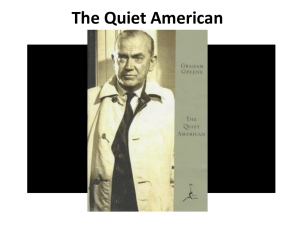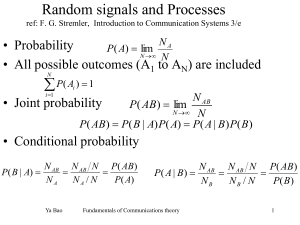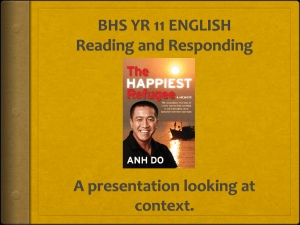Special feature - Bao Ninh interview An IB Diploma Programme
advertisement
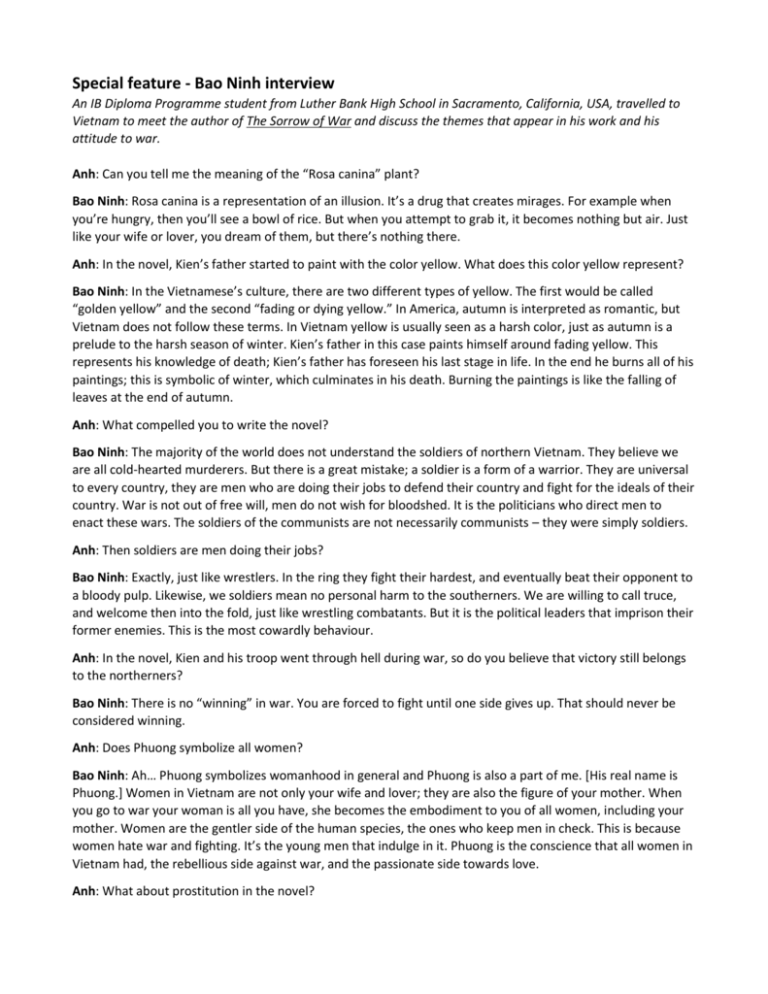
Special feature - Bao Ninh interview An IB Diploma Programme student from Luther Bank High School in Sacramento, California, USA, travelled to Vietnam to meet the author of The Sorrow of War and discuss the themes that appear in his work and his attitude to war. Anh: Can you tell me the meaning of the “Rosa canina” plant? Bao Ninh: Rosa canina is a representation of an illusion. It’s a drug that creates mirages. For example when you’re hungry, then you’ll see a bowl of rice. But when you attempt to grab it, it becomes nothing but air. Just like your wife or lover, you dream of them, but there’s nothing there. Anh: In the novel, Kien’s father started to paint with the color yellow. What does this color yellow represent? Bao Ninh: In the Vietnamese’s culture, there are two different types of yellow. The first would be called “golden yellow” and the second “fading or dying yellow.” In America, autumn is interpreted as romantic, but Vietnam does not follow these terms. In Vietnam yellow is usually seen as a harsh color, just as autumn is a prelude to the harsh season of winter. Kien’s father in this case paints himself around fading yellow. This represents his knowledge of death; Kien’s father has foreseen his last stage in life. In the end he burns all of his paintings; this is symbolic of winter, which culminates in his death. Burning the paintings is like the falling of leaves at the end of autumn. Anh: What compelled you to write the novel? Bao Ninh: The majority of the world does not understand the soldiers of northern Vietnam. They believe we are all cold-hearted murderers. But there is a great mistake; a soldier is a form of a warrior. They are universal to every country, they are men who are doing their jobs to defend their country and fight for the ideals of their country. War is not out of free will, men do not wish for bloodshed. It is the politicians who direct men to enact these wars. The soldiers of the communists are not necessarily communists – they were simply soldiers. Anh: Then soldiers are men doing their jobs? Bao Ninh: Exactly, just like wrestlers. In the ring they fight their hardest, and eventually beat their opponent to a bloody pulp. Likewise, we soldiers mean no personal harm to the southerners. We are willing to call truce, and welcome then into the fold, just like wrestling combatants. But it is the political leaders that imprison their former enemies. This is the most cowardly behaviour. Anh: In the novel, Kien and his troop went through hell during war, so do you believe that victory still belongs to the northerners? Bao Ninh: There is no “winning” in war. You are forced to fight until one side gives up. That should never be considered winning. Anh: Does Phuong symbolize all women? Bao Ninh: Ah… Phuong symbolizes womanhood in general and Phuong is also a part of me. [His real name is Phuong.] Women in Vietnam are not only your wife and lover; they are also the figure of your mother. When you go to war your woman is all you have, she becomes the embodiment to you of all women, including your mother. Women are the gentler side of the human species, the ones who keep men in check. This is because women hate war and fighting. It’s the young men that indulge in it. Phuong is the conscience that all women in Vietnam had, the rebellious side against war, and the passionate side towards love. Anh: What about prostitution in the novel? Bao Ninh: In regard to the prostitution in the book, times were very hard, and I saw a lot of former classmates become prostitutes. I knew a woman once, she was very beautiful. But when times were hard, she had to sleep with all the men in power necessary, all the way up the chain of command, to leave Vietnam, and achieve American citizenship. She was the daughter of an ex-officer in the southern Vietnamese troop. She had to find a way to survive, and she knew that her children would never be able live in Vietnam any longer. The aftereffect of war was more horrid than the bloodshed itself. This aspect was to demonstrate the hard lives of Vietnamese women, but that may be something people of your generation will never understand. Anh: How about the rape in the novel? Bao Ninh: Rape is a very common thing during war. I never approved of this idea, but nonetheless it was very common. I once saw an American soldier rape a Vietnamese girl. I was enraged by this for a long time, but then I also witnessed my fellow soldiers raping south Vietnamese girls, so I came to understand that you cannot blame a nation for a few soldiers’ crimes. Anh: What does the mute girl represent? Bao Ninh: The mute girl represents a feeling of oppression in Vietnam, and the oppression of the people of Vietnam. Anh: What does the deck of cards represent? Bao Ninh: The cards are just a way to pass time. Sometimes Americans tend to over-analyze stuff. Anh: Why was the ending of the novel so abrupt? Bao Ninh: The novel’s ending is intentionally abrupt to reflect the abrupt ending of the war. This war had lasted for a long time. And at times it seemed like the war would never end. But when it went away, it was so sudden. It made our “victory” so surreal. Anh: What is your connection to Kien? Bao Ninh: I have a strong personal connection to the novel, and in many ways Kien and Kien’s troop represent me and my troop, but this novel is still fiction. I like to get drunk, and Kien in a way is a portrayal of me in my golden years to my years in war. Kien has always been a part of me that no one understands. But I am also Phuong. Anh: And what do you mean by that? Bao Ninh: It will come to you in time. Anh: Can you explain this more? Bao Ninh: It will come to you in time. Anh: And for my last question, can you tell me about your new novel? Bao Ninh: Yes, my next novel is supposed to be about southerners. Like your uncle here. But it doesn’t feel natural to me. Anh: How so? Bao Ninh: I’ve never fought for the southerners, and I’m sure there are many differences in our lives. But I’m also sure there are many similarities.
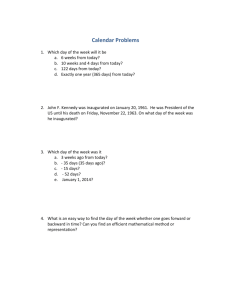
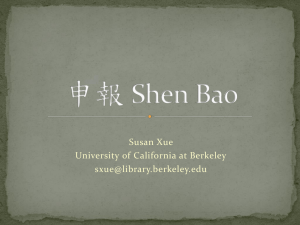
![vietnam[1].](http://s2.studylib.net/store/data/005329784_1-42b2e9fc4f7c73463c31fd4de82c4fa3-300x300.png)
